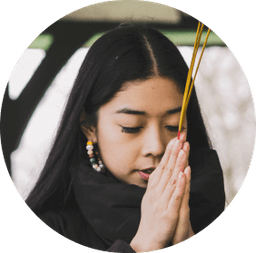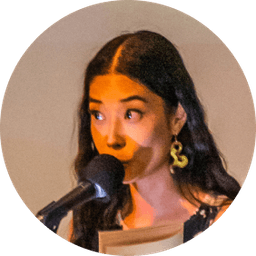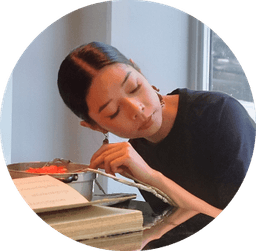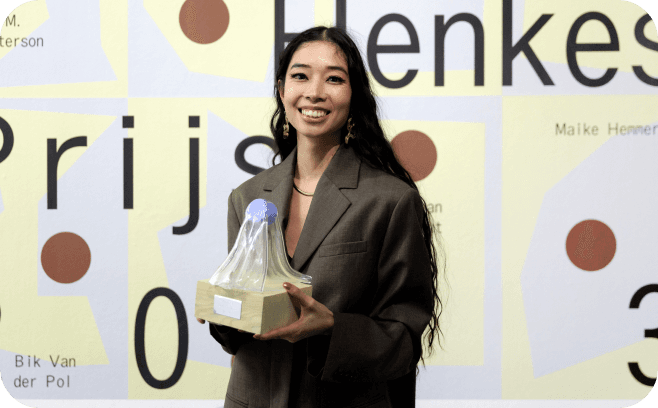My artistic practice is largely informed by my experiences as a second generation Cambodian. Our parents and their peers suffer from undiagnosed PTSD and schizofrenia because they were war children, which had a detrimental effect in our homes growing up.
Experiencing loss and displacement in my child- and adulthood broke my heart completely, but also set it wide open: I learned to express compassion for others early on, and understood the power of creating space for voices unheard. Today I am especially moved by airing (hi)stories that are painful, complex and decolonial, because I believe reckoning with them will set everyone free.

I work in Rotterdam, Yogyakarta and Siem Reap! And I mostly create kinetic art installations with sound! I also perform lecture-performances.
I am inspired by the Indianization of Southeast Asia, indigenous spiritual beliefs, and nature veneration!
I also love working together with different people, from engineers to culture bearers, and aim to create artwork that transcends borders and boundaries!

“Tol excels at unfolding the link between political and spiritual forms of reckoning. In her paintings, writing, and public projects she draws on her own experience — both of Cambodian tradition, and urban life, in Rotterdam, and London — to provide a profound understanding of what it means for cultures to exist „in the wake“ (as political theorist Christina Sharpe puts it) of tremendous violence caused by imperial expansion, and post-colonial displacement.
Tol vividly demonstrates in her art and writing how „keeping the wake“ can be a practice where communal mourning goes hand in hand with vivacious community building, and how young urban cultures may tap into old spiritual knowledge to acknowledge pain and loss, while seeking a future, and dignity in life.”

Jan Verwoert. Prof. of Art & Theory, writer & critic.
Full Bio
Samboleap Tol (b. 1990) is a Khmer artist who creates kinetic sound sculptures. Her practice investigates the postcolonial diasporic psyche, examining how political disruptions have shaped generational understandings of love, faith, and dignity. She is particularly drawn to the endurance of ideas that have persisted across thousands of years. Engaging with materiality, faith, and script, Tol seeks to uncover forms of ancestral wisdom, knowledge she applies to her own life and shares with peers who, like her, grew up distant from their ancestral lands as a consequence of war and displacement.
At the core of her work lies a recurring question: What wisdom would my ancestors have imparted to help me understand life? Her installations are often interactive, grounded in personal storytelling while simultaneously probing the fragile nature of historiography, asking whose truths are preserved, transmitted, and ultimately understood as reality.
She lives in Rotterdam and works between Yogyakarta and Siem Reap. Tol holds a Master’s degree in Fine Arts from the Piet Zwart Institute in Rotterdam and studied Fine Arts at Central Saint Martins (University of the Arts London) and the Sint Lucas School of Arts and Design in Antwerp. She also earned a degree in Media from Erasmus University Rotterdam. Notable exhibitions include Water Ways: Indigenous Ecologies and Florida Heritage (Florida State University Museum of Fine Arts, 2025), Missen als een Ronde Vorm (Stedelijk Museum Schiedam, 2025), Dolf Henkes Prijs (TENT Rotterdam, 2023), and Artist-in-Residence ( Cemeti Institute for Arts and Society, Yogyakarta 2023). Tol is the recipient of the Dolf Henkes Prize (2023).

Short Bio
Samboleap Tol (b. 1990) is a Khmer artist who creates kinetic sound sculptures. Her practice investigates the postcolonial diasporic psyche, examining how political disruptions have shaped generational understandings of love, faith, and dignity. Her installations are often interactive, grounded in personal storytelling while simultaneously probing the fragile nature of historiography, asking whose truths are preserved, transmitted, and ultimately understood as reality.
Tol lives in Rotterdam and works between Yogyakarta and Siem Reap. She holds a Master’s in Fine Arts from the Piet Zwart Institute in Rotterdam and studied Fine Arts at Central Saint Martins (University of the Arts London) and Sint Lucas School of Arts and Design in Antwerp. Exhibitions include Water Ways (Florida State University Museum of Fine Arts, 2025), Missen als een Ronde Vorm (Stedelijk Museum Schiedam, 2025), and Artist-In-Residence (Cemeti Institute for Arts and Society, Yogyakarta 2023). Tol is the recipient of the Dolf Henkes Prijs (2023).


